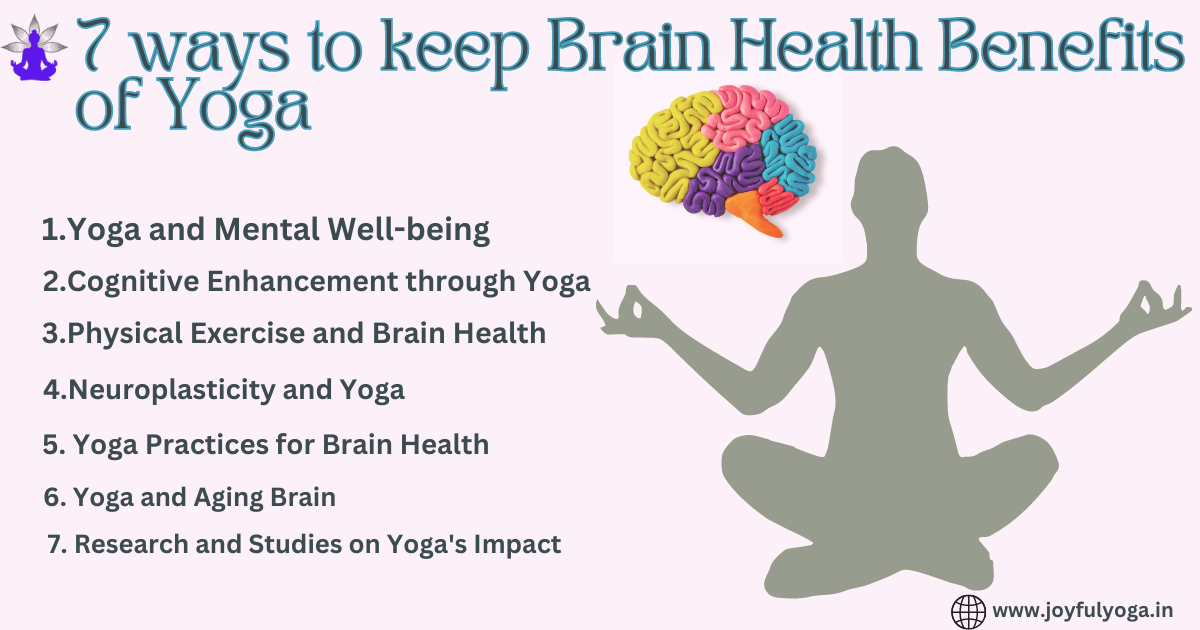Introduction to Brain Health
In today’s fast-paced world, where stress and anxiety are prevalent, maintaining optimal brain health is paramount. Our lifestyle choices significantly impact brain function. However, adopting holistic approaches like yoga can have profound effects on mental well-being.
Table of Contents
Yoga and Mental Well-being
Yoga isn’t just about physical postures; it’s a comprehensive system that nurtures both the body and mind. The practice of yoga has been linked to numerous mental health benefits. Through various postures, breathing techniques, and meditation, yoga promotes stress reduction and emotional stability.
Stress Reduction through Yoga Practices
One of the key benefits of yoga is its ability to alleviate stress. Stress can take a toll on mental health, leading to anxiety, depression, and cognitive impairments. Yoga offers a sanctuary from the chaos of daily life, allowing individuals to unwind and find inner peace.
Enhancing Emotional Stability
Yoga encourages self-awareness and emotional regulation. By cultivating mindfulness and introspection, individuals can better understand their thoughts and emotions, leading to greater emotional resilience. Yoga provides tools to cope with life’s challenges, fostering a sense of balance and well-being.
Cognitive Enhancement through Yoga
Beyond its effects on mental well-being, yoga has been shown to enhance cognitive functions. Regular practice can sharpen focus, improve concentration, and boost memory retention.
Improving Concentration and Focus
In today’s digital age, distractions abound, making it challenging to maintain focus. Yoga cultivates mindfulness, training the mind to stay present and attentive. Through focused breathing and concentration techniques, individuals can enhance their ability to concentrate on tasks.
Yoga’s Role in Memory Enhancement
Memory is essential for learning and cognitive functioning. Yoga practices that involve mental stimulation, such as meditation and visualization, can enhance memory retention. By promoting relaxation and reducing mental clutter, yoga creates an optimal environment for information processing and storage.
Physical Exercise and Brain Health
Physical exercise is not only beneficial for the body but also for the brain. Engaging in regular physical activity has been shown to improve cognitive function and reduce the risk of neurodegenerative diseases.
The Impact of Physical Activity on Brain Function
Exercise increases blood flow to the brain, delivering oxygen and nutrients essential for optimal functioning. Physical activity also stimulates the release of neurotransmitters like dopamine and serotonin, which are crucial for mood regulation and cognitive performance.
How Yoga Combines Physical and Mental Exercise
What sets yoga apart from traditional forms of exercise is its holistic approach. While yoga promotes physical strength and flexibility, it also incorporates mindfulness and breathwork, stimulating the brain and promoting overall well-being.

photo by unsplash
Neuroplasticity and Yoga
Neuroplasticity refers to the brain’s ability to adapt and reorganize itself in response to experiences and stimuli. Yoga has been shown to influence neuroplasticity, leading to structural and functional changes in the brain.
Yoga’s Influence on Brain Structure
Research suggests that regular yoga practice can increase gray matter volume in brain regions associated with memory, attention, and emotional regulation. These structural changes indicate a potential for enhanced cognitive function and emotional resilience.
Promoting Neurogenesis through Yoga Practices
Neurogenesis is the process of generating new neurons in the brain. Certain yoga practices, such as meditation and pranayama (breath control), have been found to stimulate neurogenesis. By promoting the growth of new brain cells, yoga holds promise for cognitive enhancement and neuroprotection.
Yoga Practices for Brain Health
To reap the brain health benefits of yoga, incorporating specific practices into your routine is essential. From mindfulness meditation to breathing exercises, here are some techniques to enhance mental well-being.
Mindfulness Meditation and Brain Health
Mindfulness meditation involves paying attention to the present moment without judgment. This practice has been shown to reduce stress, improve mood, and enhance cognitive function. By training the mind to focus on the here and now, mindfulness meditation fosters mental clarity and emotional balance.
Breathing Exercises for Cognitive Enhancement
Breathwork, or pranayama, is an integral part of yoga practice. Deep breathing techniques like diaphragmatic breathing and alternate nostril breathing can calm the nervous system, reduce anxiety, and improve cognitive performance. By regulating breathing patterns, individuals can enhance oxygen flow to the brain, promoting alertness and mental acuity.
Yoga and Aging Brain
As we age, maintaining brain health becomes increasingly important. Yoga offers a holistic approach to healthy aging, preserving cognitive function and promoting overall well-being.
Maintaining Brain Health as You Age
Age-related cognitive decline is a common concern among older adults. However, research suggests that engaging in activities like yoga can help preserve brain function and slow down cognitive decline. By staying physically active and mentally engaged, individuals can promote neuroplasticity and maintain cognitive vitality.
Delaying Cognitive Decline through Yoga
Studies have shown that yoga practice can improve cognitive function in older adults, including memory, attention, and executive function. By challenging the brain with new movements and mental tasks, yoga promotes neuroplasticity and stimulates cognitive reserves, delaying the onset of age-related cognitive decline.
Research and Studies on Yoga’s Impact
The benefits of yoga for brain health are supported by a growing body of scientific research. Numerous studies have demonstrated the positive effects of yoga on cognitive function, emotional well-being, and overall brain health.
Studies on Yoga and Brain Health
Research conducted on yoga and brain health has yielded promising results. Studies have shown that regular yoga practice can improve cognitive performance, enhance mood, and reduce symptoms of anxiety and depression. From neuroimaging studies to clinical trials, evidence continues to mount in support of yoga’s benefits for the brain.

photo by unsplash
Expert Opinions on Yoga’s Positive Effects
Leading experts in neuroscience and psychology have recognized the potential of yoga to promote brain health. Renowned neuroscientist Dr. Richard Davidson has conducted extensive research on the effects of meditation and mindfulness on the brain, highlighting yoga’s role in fostering emotional resilience and cognitive well-being. Psychologist Dr. Ellen Langer has also emphasized the importance of mindfulness and mind-body practices like yoga for promoting overall health and vitality.
Incorporating Yoga into Daily Routine
Integrating yoga into your daily routine doesn’t have to be daunting. With a few simple strategies, you can make yoga a regular part of your lifestyle, reaping the numerous benefits for brain health and overall well-being.
Creating a Yoga Practice Schedule
Start by carving out dedicated time for yoga practice in your daily schedule. Whether it’s a morning routine to kickstart your day or an evening wind-down session, consistency is key. Set realistic goals and gradually increase the duration and intensity of your practice as you progress.
Overcoming Barriers to Consistent Practice
While establishing a yoga routine may seem challenging at first, there are ways to overcome common barriers. Find a yoga style that resonates with you and fits your lifestyle. Whether it’s attending classes at a local studio, following online tutorials, or practicing at home, explore different options until you find what works best for you. Remember that every moment spent on the mat contributes to your overall well-being.
Conclusion
In conclusion, the benefits of yoga for brain health are undeniable. From reducing stress and enhancing cognitive function to promoting neuroplasticity and healthy aging, yoga offers a holistic approach to mental well-being. By incorporating yoga into your daily routine and embracing its transformative power, you can nurture a healthy mind and body for years to come.
FAQs (Frequently Asked Questions)
1. Can yoga really improve brain function?
Yes, scientific research has shown that yoga practices such as meditation, breathing exercises, and physical postures can enhance cognitive function and promote overall brain health.
2. How often should I practice yoga to experience the benefits?
Consistency is key when it comes to yoga practice. Aim for at least 2-3 sessions per week to reap the rewards for brain health and mental well-being.
3. I’m new to yoga. Where should I start?
If you’re new to yoga, consider starting with beginner-friendly classes or online tutorials. Focus on building a strong foundation and gradually explore more advanced practices as you gain confidence and experience.
4. Can yoga help with anxiety and depression?
Yes, yoga has been shown to reduce symptoms of anxiety and depression by promoting relaxation, stress reduction, and emotional balance.
5. Is yoga suitable for older adults?
Absolutely! Yoga can be adapted to suit people of all ages and fitness levels. There are even specialized yoga classes designed specifically for seniors, focusing on gentle movements and mindful breathing techniques to support healthy aging.


2 thoughts on “7 ways to keep brain healthy with daily workout with yoga & meditation/Brain Health Benefits of Yoga”